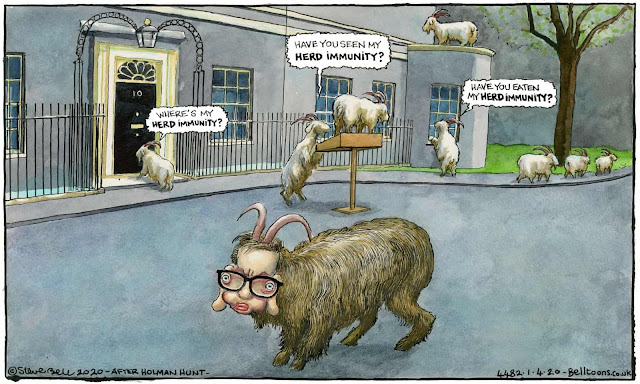What feels like a very long year ago, in April 2020, I devoted my PC Pro magazine column to the looming Covid-19 pandemic, describing the way in which the official response was attracting competing advice from immunologists and social psychologists, the gap between what we needed objectively to do and what we could subjectively be persuaded to do. Looking back now the UK’s pandemic performance has been poor, with a relatively high absolute number of deaths and deaths per million compared to many other countries (see Our World In Data). It has been partly redeemed though by a roll-out of vaccination faster and more efficient than most.
In retrospect, carrying on scientific arguments about testing, social distancing, mask-wearing and vaccination via the mass media hasn't been so much “transparent” as a cause of mass confusion and destruction of public confidence. Consider a couple of random clippings about the pandemic I’ve collected from newspapers:"We now know the new variant spreads between 30% and 70% faster than others and it could be 30% more deadly for some people"
"Around 8% of participants in the AstraZeneca efficacy trials were aged between 56 and 6 years old, only 3 to 4% were over 70. This does not result in an efficacy of only 8% among seniors.”How much information such reports impart to most readers must be doubtful -- people whose daily lives don’t involve mathematics aren’t generally very good with percentages, tending to think of them as additive when in fact they’re multiplicative. “30% more deadly for some people” isn’t entirely meaningless, but all it actually means is simply “be afraid” (that trigger word “deadly”) while giving no idea whether you in particular need to fear since “some” isn’t quantified: is it 10%, 50%, 80%? And the AstraZeneca clip, strewn with figures like pepperoni on a pizza, made my eyes glaze over (and I’ve been tutored in statistics).
Statistics are employed precisely to iron-out individual differences, so they tell us how many people on average are likely to get sick after catching the SARS-CoV-2 virus, and how many of those on average are likely to die of it – hugely important to people who have to plan allocation of hospital beds, PPE and so on, but not so to non-technical citizens whose own personal chance as an individual is what matters.
The problem has become especially acute since the discovery of a rare blood clotting condition in a very small number of people inoculated with the AstraZeneca and Johnson & Johnson vaccines: use of these vaccines has been restricted or paused in several countries, and the gift to anti-vaccine propagandists has been enormous. Sensational press reporting of this problem has severely damaged the reputation of vaccines that have several advantages - in storage, dose number, price or licencing - over the others. This PR disaster is well explained in the theBMJ journal, and should you want a (highly technical) further explanation of the clotting issue, there's this in The Atlantic magazine.
Shocking as it might feel to say this out loud, at 1 to 3% mortality Covid isn’t lethal enough to terrify most people under 50 into properly conforming to test, trace and isolate, but it is quite lethal enough to trigger empathy towards the old and the vulnerable, and this being so any government will be damned every which way when trying to decide on lockdown easing or vaccine distribution.







